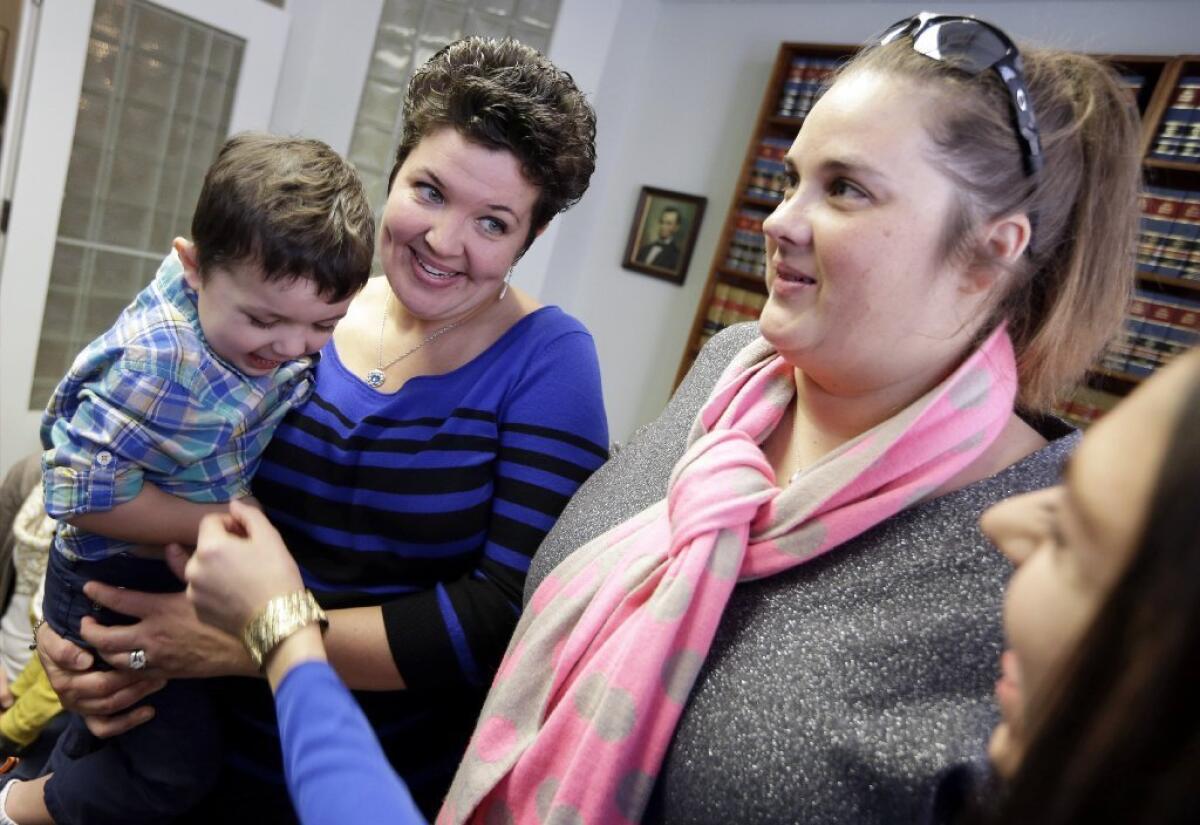Same-sex marriage roundup: Nevada, Utah, Oklahoma, Ohio, Indiana

- Share via
It was a busy day Monday for arguments over same-sex marriage’s legality at the state level across the country.
Perhaps the biggest news came out of Nevada, where the attorney general and governor announced that the state would no longer defend its 2002 ban on same-sex marriage in federal court.
The law had been challenged by an LGBT legal advocacy group, Lambda Legal, which appealed after a federal judge upheld the law in 2012.
“The state’s argument cannot withstand legal scrutiny,” Catherine Cortez Masto, Nevada’s attorney general, said in a motion filed with the U.S. 9th Circuit Court of Appeals in San Francisco, asking to withdraw Nevada’s legal argument against same-sex marriage.
That move came with the approval of Nevada’s Republican governor, Brian Sandoval. “Based upon the advice of the attorney general’s office and their interpretation of relevant case law, it has become clear that this case is no longer defensible in court,” a spokeswoman for Sandoval said in a statement emailed to the Los Angeles Times.
“The governor frankly made the only call he could,” Lambda Legal Senior Attorney Tara Borelli said in a statement Monday, citing a January ruling by the appeals court that raised the standards the marriage ban would have had to meet in court.
The Nevada ban has yet to be struck down or removed from the books, however, and remains in effect.
Meanwhile, five religious groups -- including Mormons, Catholics and evangelicals -- filed a brief Monday with the U.S. 10th Circuit Court of Appeals in Denver asking that bans in Utah and Oklahoma be upheld.
Federal judges in both states had struck down their respective bans on same-sex marriage as unconstitutional, setting up a legal showdown at the 10th Circuit.
The amicus brief was filed jointly by the U.S. Conference of Catholic Bishops, the National Assn. of Evangelicals, the Church of Jesus Christ of Latter-day Saints, the Ethics and Religious Liberty Commission of the Southern Baptist Convention, and the Lutheran Church-Missouri Synod.
“Our support for traditional marriage stands on the affirmative belief that husband-wife marriage complements our human natures as male and female, promotes responsible procreation, and provides the best environment for children,” the brief stated.
Any ruling on same-sex marriage by the 10th Circuit would be subject to another possible ruling by the U.S. Supreme Court, which struck down part of the federal Defense of Marriage Act last summer without outright declaring state bans unconstitutional.
In Ohio, four married gay couples filed a federal lawsuit requesting that the state recognize their marriages on birth certificates, according to the Associated Press.
The move follows a recent victory in federal court in which such couples earned the right to be recognized on Ohio death certificates.
Rob Nichols, a spokesman for Republican Gov. John Kasich, declined to comment to the AP about the lawsuit “except to say that the governor believes marriage is between a man and a woman.”
The wire service reported that same-sex marriage advocates hoped to bring a November ballot measure to reverse a 2004 referendum by Ohio voters that overwhelmingly approved the state’s ban.
In Indiana, a state Senate committee voted 8 to 4 along party lines Monday to send a constitutional amendment banning same-sex marriage to the full state Senate for a vote, the Indianapolis Star reported.
With same-sex marriage bans around the country increasingly under siege, Indiana has been an outlier, moving this year to legally restrict the practice.
Indiana’s House of Representatives had removed a provision that also would have banned civil unions before passing the bill and sending it to the Senate, which could restore the provision, the Star reported.
Indiana laws require that constitutional amendments be passed by two separately elected legislatures before the proposal can go to voters for approval, according to the newspaper -- meaning that the Legislature would have to pass the ban again in 2015 to set up a vote in November 2016.
Follow LATimes National at: https://www.facebook.com/LATimesNational
More to Read
Sign up for Essential California
The most important California stories and recommendations in your inbox every morning.
You may occasionally receive promotional content from the Los Angeles Times.











